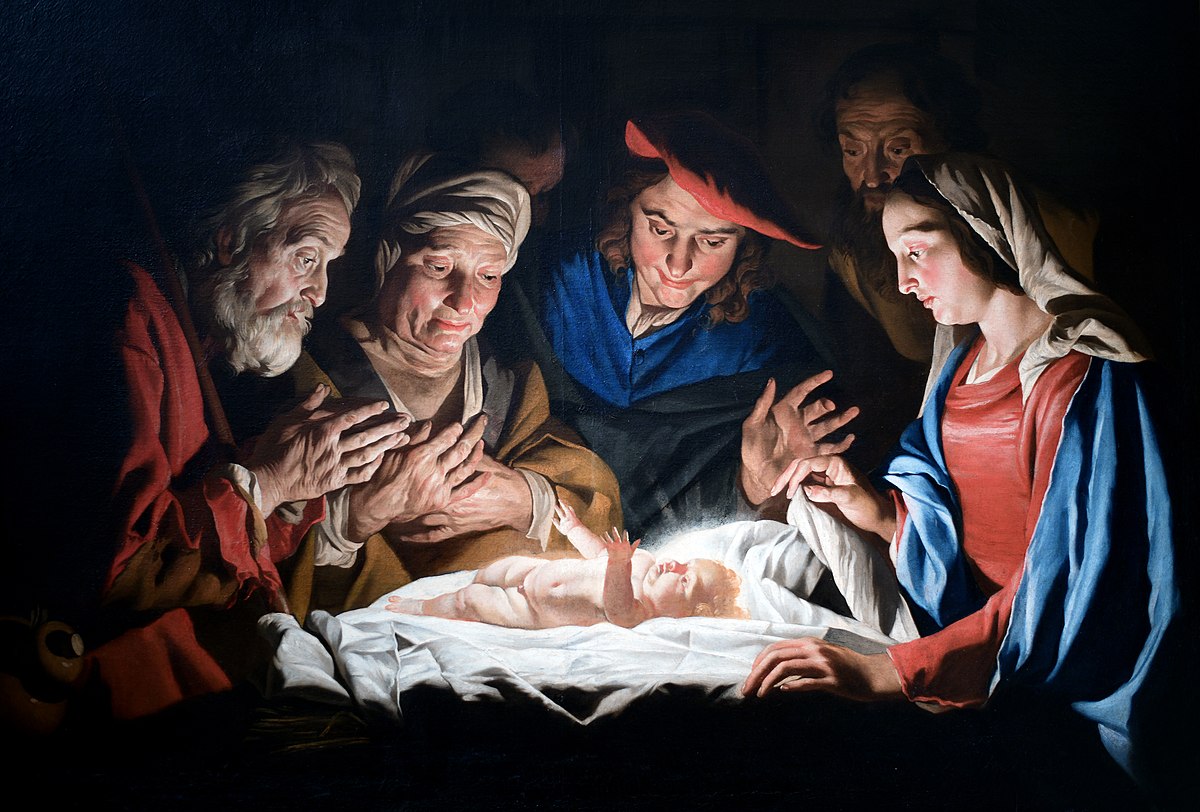
The short answer is – it isn’t!

However, to anyone looking from the outside, Christmas would seem to be the biggest festival of the Christian year. It has the 4 week build-up with Advent, there are more carol services than you can shake a yule-log at, and the churches are packed with people who may not have even stepped inside a church since last Christmas!
If any event in the christian calendar could be considered the most important it’s Easter.
 Why Easter?
Why Easter?
The early church didn’t bother with Christmas for 3 reasons :
- Jesus’ death and resurrection was considered far more important.
- Generally, birthdays weren’t seen as that significant.
- They didn’t actually know when it was.
Early Christianity had room for only one big celebration: Easter, or as they called it, Pascha – the name adopted from the Jewish Passover. It was a resurrection-centred religion. Christians would keep awake and watch all night on the eve of Easter, and celebrate with a dawn mass.*
* The Easter vigil is still maintained in the Eastern church.
Over time, this celebration expanded into a week – Holy Week, or Great Week as it was known in the East – which the Church filled with ceremonies that recalled the events of the final days leading up to the death of Christ. And then it grew some more, with 50 days of celebrations leading to the second of the major Christian feasts: Pentecost. And finally, they added the forty days of Lent.
 Happy (Un)Birthday
Happy (Un)Birthday

Birthdays were something that pagans celebrated, not Christians.
So, early Christians weren’t really worried about birthdays: they were more concerned with the other end of the life cycle.
For much of the first 3 centuries of its life, Christianity was an illicit, often illegal, religion. Christians were persecuted. They were marginalised, ostracised, mocked, and occasionally arrested, beaten and brutally killed. The deaths of these witnesses – or to use the Greek word martyrs – were celebrated and remembered by the addition of various saints’ days.
Birthdays were something that pagans celebrated, not Christians.
 So, Why Christmas ?
So, Why Christmas ?
So, if that’s the case, then why did Christmas get thought of at all?
 AD 33-312: PERSECUTION, DISPERSION AND FLOURISHINGOne reason is that, surprisingly, despite the persecution, Christianity spread throughout the empire (see our article ‘The Spread of Christianity in the Ancient World’). So you had more people – both followers and opponents of Jesus – who wanted to find out about the historical basis of the faith.
AD 33-312: PERSECUTION, DISPERSION AND FLOURISHINGOne reason is that, surprisingly, despite the persecution, Christianity spread throughout the empire (see our article ‘The Spread of Christianity in the Ancient World’). So you had more people – both followers and opponents of Jesus – who wanted to find out about the historical basis of the faith. AD 312 : CHRISTIANITY GOES 'MAINSTREAM' And then, even more surprisingly, Christianity got really popular. So popular that it became one of the official religions of the Roman Empire . That happened under the reign of Constantine I. Constantine was a christian – of sorts. He moved the centre of power east, away from Rome, to a new city that he created and called, modestly , Constantinople.
AD 312 : CHRISTIANITY GOES 'MAINSTREAM' And then, even more surprisingly, Christianity got really popular. So popular that it became one of the official religions of the Roman Empire . That happened under the reign of Constantine I. Constantine was a christian – of sorts. He moved the centre of power east, away from Rome, to a new city that he created and called, modestly , Constantinople. EMPEROR CONSTANTINES CHURCH BUILDING PROGRAMMEConstantine began a huge, well funded church-building programme. Before this, churches really hadn’t been a thing ; if you think that at any point a rampaging mob might come down the street thirsting for your blood, you tend not to draw attention to yourself by building enormous buildings.
EMPEROR CONSTANTINES CHURCH BUILDING PROGRAMMEConstantine began a huge, well funded church-building programme. Before this, churches really hadn’t been a thing ; if you think that at any point a rampaging mob might come down the street thirsting for your blood, you tend not to draw attention to yourself by building enormous buildings.
if you think that at any point a rampaging mob might come down the street thirsting for your blood, you tend not to draw attention to yourself by building enormous buildings
The ability to freely practice your religion and the establishment of permanent meeting places meant that the church could developed a much more detailed liturgy and programme of services, one of which was a popular , winter-based Christian festival
No, not Christmas. Epiphany. WINTER FESTIVAL : EPIPHANYEpiphany was celebrated on 6th January*.
WINTER FESTIVAL : EPIPHANYEpiphany was celebrated on 6th January*.
Initially it was primarily a festival associated with Jesus’ baptism, which was the time when, in some of the gospel accounts, a dove (ie the Holy Spirit in bird form) descended on Jesus and a voice said: ‘You are my Son, whom I love; with you I am well pleased’ . The idea was that Jesus’ ‘birth’ took place at his baptism that it was at this point that he became the ‘Son’ of God. Before then he had just been plain old Jesus of Nazareth.
*no-one knows exactly why this date was chosen. EPIPHANY SPREADSThe celebration of Epiphany caught on, spreading from Egypt, up the eastern Mediterranean and into the eastern half of the empire. Certainly, by the fourth century, Epiphany on 6th January was widely observed in the Eastern church, and although it was still heavily about the baptism of Jesus, the other bit – the visit of the Magi – gradually gained prominence,
EPIPHANY SPREADSThe celebration of Epiphany caught on, spreading from Egypt, up the eastern Mediterranean and into the eastern half of the empire. Certainly, by the fourth century, Epiphany on 6th January was widely observed in the Eastern church, and although it was still heavily about the baptism of Jesus, the other bit – the visit of the Magi – gradually gained prominence,
A monk called John Cassian (c. 360-435) wrote that in Egypt the clergy regarded Epiphany :‘as the time, both of our Lord’s baptism and also of His birth in the flesh’
 BETHLEHEMMeanwhile as part of Constantine’s church-building programme, he also commissioned a church in Bethlehem to be built over the very place where Jesus had been born.
BETHLEHEMMeanwhile as part of Constantine’s church-building programme, he also commissioned a church in Bethlehem to be built over the very place where Jesus had been born.
Epiphany became a huge celebration in Bethlehem. It started the day before with a reading of Luke 2:8-10 in situ, as it were, in the fields around Bethlehem. Then there was an all-night vigil, followed by a service, which included the visit of the Magi. The festival went on for 8 days. AND CHRISTMAS?However, if the Church already had Epiphany as a kind of birthday; then why did they even need Christmas?’ Good question. The thing is that: Epiphany was an Eastern festival. In Rome, in the West:, they didn’t join in. Instead, they decided that they would have a different: birthday celebration. And in AD 440 they chose 25 December. Part of this decision may have been based on usurping the old Roman festival of Saturnalia.
AND CHRISTMAS?However, if the Church already had Epiphany as a kind of birthday; then why did they even need Christmas?’ Good question. The thing is that: Epiphany was an Eastern festival. In Rome, in the West:, they didn’t join in. Instead, they decided that they would have a different: birthday celebration. And in AD 440 they chose 25 December. Part of this decision may have been based on usurping the old Roman festival of Saturnalia.
If you want to know if we can work out when Jesus’s real birthday might of been then read our article “Was Jesus really born on the 25th December?”
That said, it’s really only in the past 200 years, that it has become the uber-festival that it is today.





